If you have an inflatable dinghy with a keel and a fixed transom, you might want to skip the electric trolling motor and invest in a gasoline-powered outboard motor.
Unlike electric trolling motors, outboard motors can make your boat go fast. You’ll be able to get your boat on plane, which is always a thrill.
Contents
Best outboard motor for an Inflatable Dinghy
Here are the most reliable outboards you can buy in 2024:
Coleman 2.6HP Outboard Motor
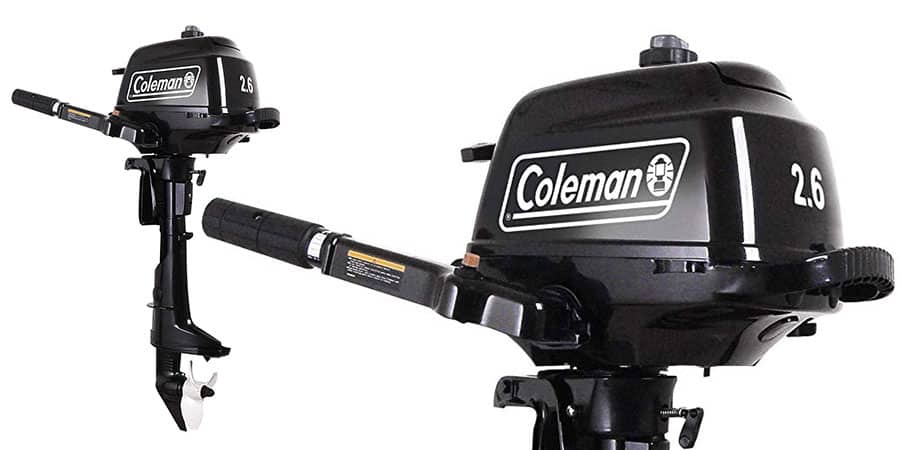
Pros
Cons
The Coleman Outboard Motor has the smallest power output in this list. There is, however, an available 5 HP for the same engine, but this is the more popular option between the two.
This engine is perfect for SIBs. It has 1 cylinder OHV 4-stroke motor, and the entire equipment weighs 37 lbs.
The engine operates efficiently and quietly. It also features 360-degree steering, with adjustable steering friction and vibration reduction, perfect for maneuvering through shallow water. It has a marine alloy exterior that is durable and rust-proof.
Coleman 2.6 motor specifications:
- Lightweight (37.5lb)
- 4-stroke Motor
- 31 gallon internal gas tank
- Easy start TCI ignition
- F-n/360 degree steering
- 1 cylinder OHV engine
- CE & EPA Approval
Hangkai 3.6HP 2-stroke Outboard Motor
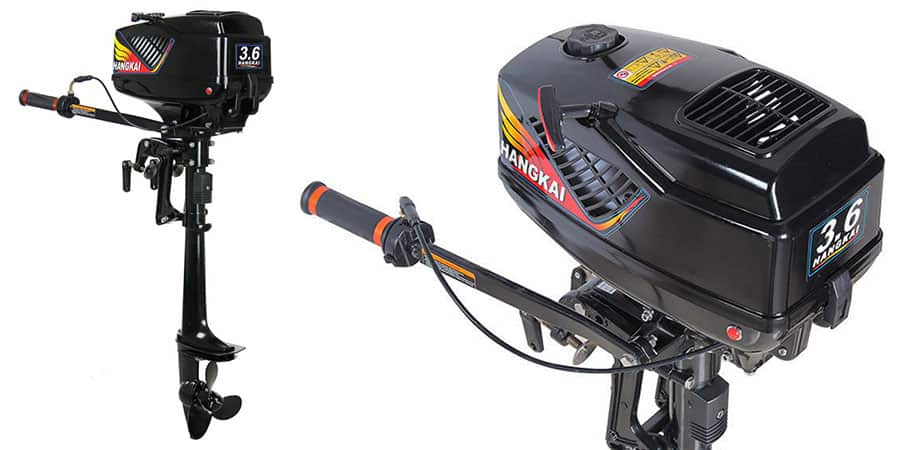
Pros
Cons
This little outboard can be a good performer at a great price, but you have to know what you are doing. This is a 2-stroke motor, so it requires a little more maintenance and care. Make sure you follow the oiling instructions carefully.
Here is a video to get you familiar with the ins and outs of this motor.
It is a good match with inflatable fishing boats, but it will start struggling when there are a lot of people (4+) in the boat.
Hangkai 3.6 outboard specifications:
- Weight: 21.4 pounds (ca. 10 kg)
- Shaft:40 cm
- Stroke: 2-Stroke
- Engine (HP): 3.6HP
- Ignition: CDI system
- Cooling: Water Cooling
Honda 5S 5 HP 4-stroke motor
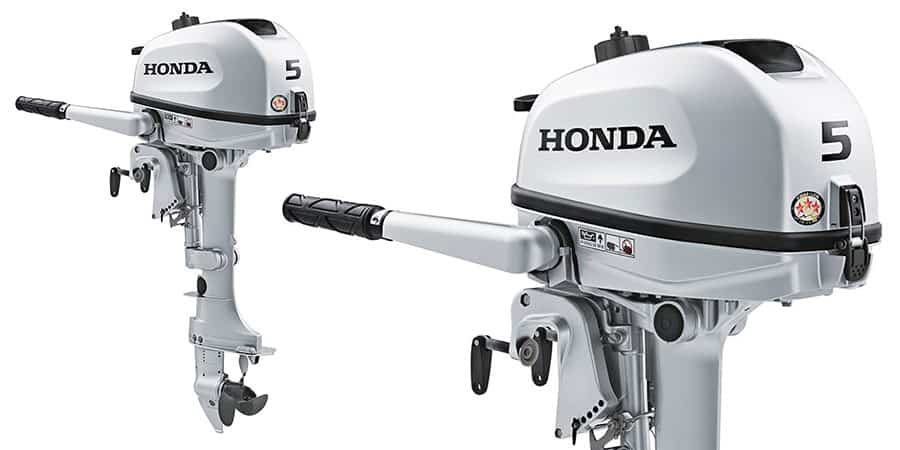
Pros
Cons
The Honda 5S is a very popular motor for good reason. It is reliable and works well, you won’t hear much complaining about it. It is considered light weight at 60 lbs.
Being a premium engine, it commands a premium price though.
Starting the Honda 5 is a dream. You can actually start it with 2 fingers, no more pulling and pulling on the engine. This is because it has a low recoil pull weight.
Here is a video showing you what this motor can do.
Honda 5S specifications:
- Easy one hand manual pull starting
- 4-stroke
- Honda’s True 5 Warranty
- Low emissions
- Weight: 60 lbs
- Mount System absorbs vibration and provides smooth operation
- Gear: forward – neutral – reverse
- Shaft: 15″
- Internal fuel tank: 1.5 L
- External fuel tank connection
- Shallow Water Drive
Honda 9.9S 10 HP 4-stroke motor
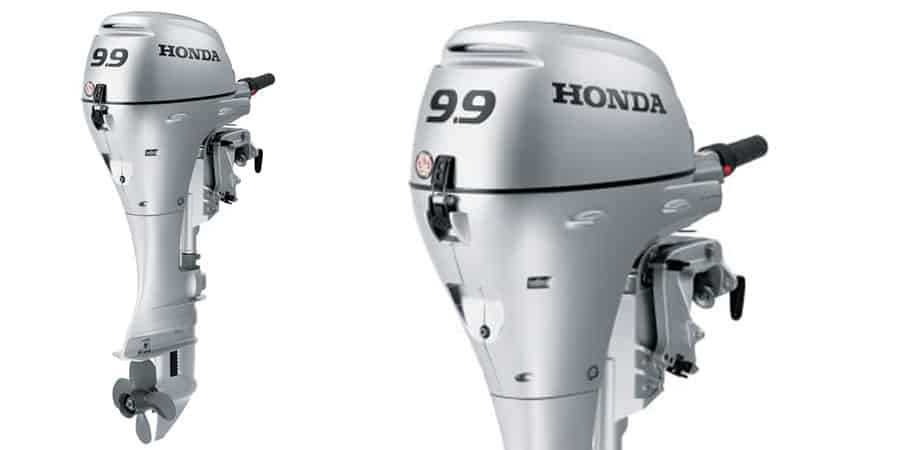
Pros
Cons
Just like the 5S, the Honda 9.9S is the most popular outboard motor in its class. It is reliable, easy to start, and has a 5 year warranty period.
The 10 HP class is a sweet spot for a lot of people. It is powerful enough to tackle most situations, but still light enough to be portable. This is important with inflatable boats.
Just like the 5S, it is the most expensive motor in its class. Quality comes at a price.
Here is a video showcasing this wonderful motor.
Honda 9.9S specifications:
- Easy one hand manual pull starting
- 4-stroke, 2 cylinder
- Honda’s True 5 Warranty
- Low emissions
- Weight: 92 lbs (42 kg)
- Gear: forward – neutral – reverse
- Shaft: 15″
- Internal fuel tank: 1.5 L
- External fuel tank connection
Mercury 20 HP Electric Start 4 Stroke Outboard Motor
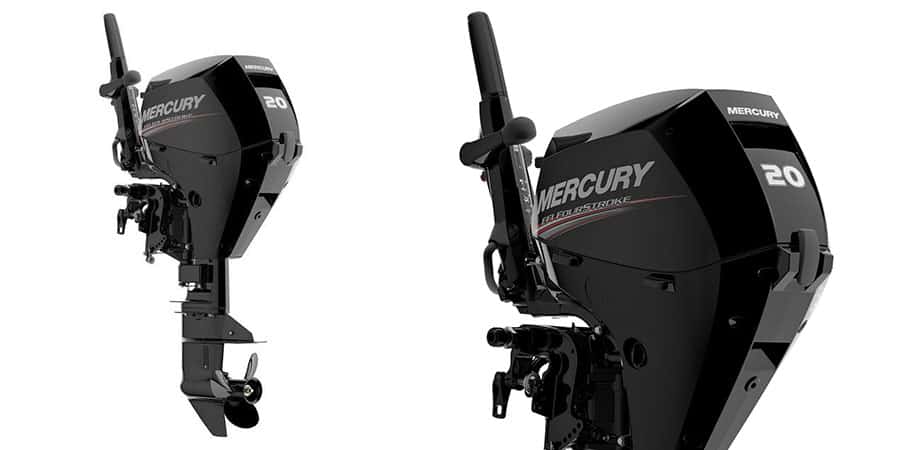
Pros
Cons
The Mercury Outboard Engine features an ultra-quiet and smoke-free operation. Unlike the first two motors listed above, Mercury Outboard Engine has an electric start-up system.
It also features a multi-functioning tiller handle, auto ratchet title, and vibration absorbing wishbone mount.
This outboard motor is the most popular pick for fuel-powered engines. It is powerful, reliable, durable, and portable. It is especially popular for having the ease of maneuvering of 2 stroke engines in a 20 HP 4-stroke motor.
Mercury 20 HP Outboard Motor specifications:
- Engine Type: 4-stroke
- Features: 4-stroke technology-quiet, environmentally friendly, 40% more fuel efficient than comparable 2-stroke engines, smooth running/exceptional idling
- Exhaust: Thru-prop
- Start: electric Start-up system
- Steering Type: Tiller (2.5-6hp), tiller or remote (8 and higher)
- Gearing: F-N-R, 2.15:1; Model 10181675-F-N-R
- Trim Positions: 5 + shallow-water drive
- Tank Capacity: 6.6 gallon
- Weight: 99 lb (45 kg)
Parsun 20 HP Four Stroke Outboard Motor
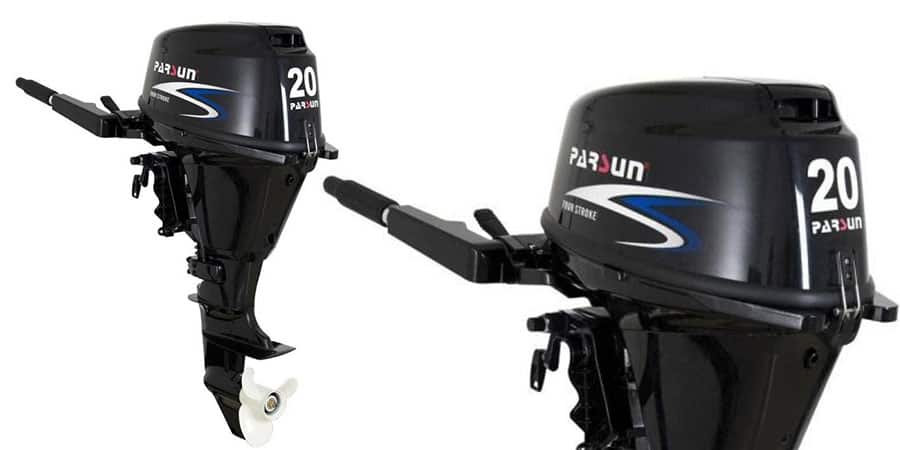
Pros
Cons
Parsun Four Stroke Outboard Motor has an exterior housing constructed from marine aluminum alloy. It is highly resistant to rusting and corrosion.
It also has zinc coating on internal water passages to prevent them from rusting.
The Parsun Motor also gives available options to fit customers’ preference: electric start or manual start and short or long shaft.
But probably the thing about Parsun motors is their price. This 20 HP model costs roughly half what a comparable Mercury would cost. That’s quite a difference.
Is it as reliable and easy to service? Of course not. But if you take care of it, it is a good engine.
Parson 20 HP motor specifications
- Engine type: 4-stroke 2-cylinders, DOHC
- Displacement: 362 cc
- Max output: 20HP / 14.7kw
- Full throttle RPM range: 5000~6000
- Ignition system: CDI
- Gear shift: Forward-Neutral-Reverse
- Gear ratio: 2.08:1 (27/13)
- Trim and tilt system: 4 positions/Shallow drive
- Max fuel consumption: 6.9 L/h
- Fuel tank capacity: External 24L
- Sump oil capacity: 1.6L
- Gear oil capacity: 300cc
- Dry weight: 114 lbs (52 kg)
- Overall width: 16.5 inches / 420 mm
- Recommended transom height: Short Shaft 15-16 inches; Long Shaft 20-21 inches
- Propeller: Aluminum 3-91/4″x11″,
- Alternator output: 12V 6 amps/76 watts
How strong should your outboard engine be?
You may be wondering how to choose an outboard motor for your boat. While your wallet will be a major factor in which model you go for, it’s worth reading a few tips on what to consider.
Bigger doesn’t always mean better. In choosing the perfect HP for your inflatable boat, there are two factors you need to take in consideration:
Boat Usage and Needs
Boat HP ratings are essential in guiding you on how much power your boat will need. However, you should also take into consideration what you intend to use the boat for. This also includes who, what, and how many/much will you load into your boat.
Maneuvering on rough seas and carrying too many people or gear aboard may affect the performance of your motor. If you use low HP in powering your boat under the conditions stated above, there is a tendency for your motor to do heavy work during operations. Needless to say, having insufficient HP on your boat under the same conditions will not be enough to get you moving, so it really is an important factor to consider.
Typically, buyers will opt to buy the least HP needed especially for boats they use for recreation.
For example: If you have a boat that is rated for a motor with 50 to 90 HP, people will usually buy a 50 HP outboard motor. Ideally, it will get the job done. However, that 50 HP motor will work harder and will require more fuel; this can considerably shorten your motor’s life span and cost you a lot in refueling, so consider meeting the rating halfway by buying a 70 HP motor.
Fuel Efficiency
Another factor to consider is your motor’s fuel efficiency. The amount of fuel that you will need will also depend on the horsepower of your motor. In general, a gasoline engine will burn 0.50 lb per HP and a Diesel engine will burn around 0.40 lb per HP.
You know what this means! That’s right, the higher the HP, the higher the fuel consumption. Fortunately, as stated in the section above, there are instances wherein an engine burns fuel more than what it normally does.
One of those situations is over the performance of an outboard motor because of HP mismatch with usage and luggage. Another is operating your boat in full-throttle; this burns your fuel the fastest. When out in the water, do not leave your throttle wide open; operating with two-thirds to three-thirds throttle will save you lots of fuel.
Note: If you’re having a hard time estimating how much HP you will need, you can use this HP calculator to determine the best motor for you. Simply, fill in the blanks and let it calculate for you.
Price of the Motor
With outboard motors, there is a direct connection between price and quality. Believe me, I know how hard it is to pay more for something that you can get for half price from another company.
The thing is that outboard motors require maintenance and skill to keep running optimally. A low priced motor will be of lower quality, which means you will have to service and tinker with it more.
If you are experienced with boat motors, you will probably be OK with a lower priced model. If not, you should get a higher quality model in whatever class you are looking at.
Outboard Motor Maintenance
Below are some reminders on how to make your outboard engine last a long time:
- Flush out the engine, via its water pump. To flush it out, simply turn on the motor and let its water pump do the rest of the work. You may need to check on the flow of the water pump though to ensure it has no problems.
- Remember to let the engine burn all the remaining fuel before keeping it in storage.
- Regularly inspect the engine for leaks, cracks, and worn out parts.
- Lubricate all the moving parts of your engine such as: carburetor valves, shaft, and etc.
To guide you better, watch this video about Outboard Motor Maintenance.

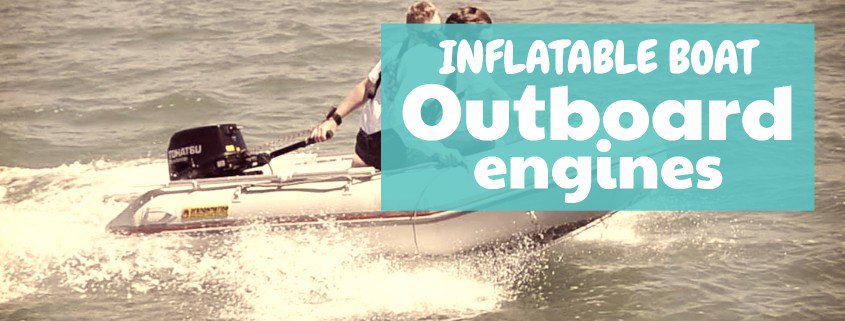

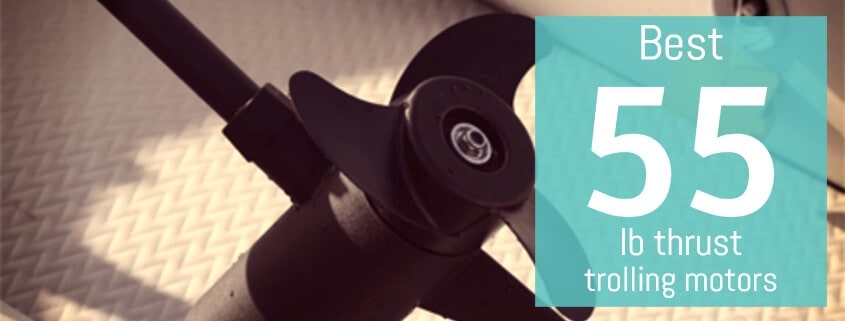
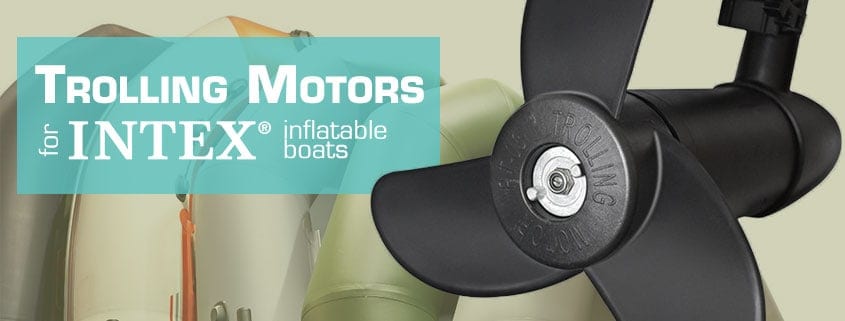
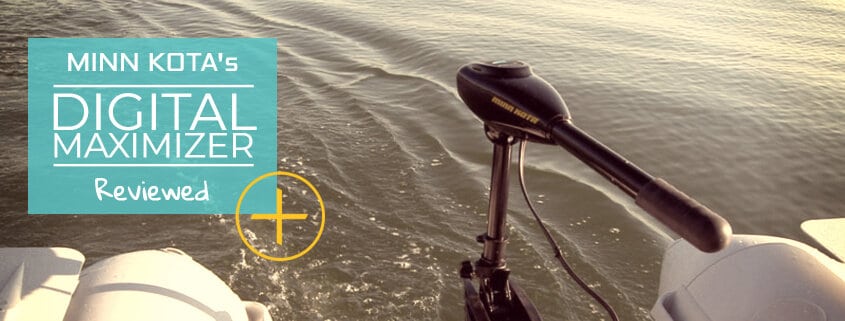
Hello, I’m looking to get a motor for an Intex mariner 3. It’s rated for 3hp but I can get a 4 stroke 4hp for less than the cost of a trolling motor and battery setup. However is this an unsafe setup given Intex’s specs? Thank you.
Hi, that should still be ok, it’s not that strong of a motor.
You talked about brands which do not have dealership easily available in BC, Canada.
Your take on Tohatsu 20hp vs Suzuki 20hp for first time boater ?
They are both respected brands and essentially the same in specs. I would go with the one that gives you a longer warranty.
I like how you said to get an HP for the kind of activity you need your boat to do. You want to get an engine that can handle what you’re trying to do but you don’t want one that’s going to take more fuel than necessary. My grandpa’s boat needs a new engine and I want to surprise him with one for Christmas, so thank you for that helpful tip.
I’m looking to get back into boating so I’ll have to pick a motor. I’m not really too sure as to what one I should get. The third one down you have listed looks pretty decent so I might give that one a shot.